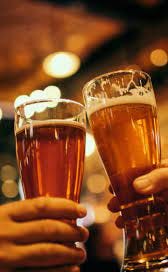"We must accept finite disappointment, but never lose infinite hope." Martin Luther King, Jr. said those words and they've been turning up a lot in the days following the MLK holiday a couple weeks ago.
It may well be my mantra for the next four years as I watch the federal government attempt to undo so much of the societal progress we’ve made. But it also struck me that the quote has significant relevance for cancer survivors. It’s not always a straight road from diagnosis to survivorship (it’s not even clear what survivorship is). Good scans are often followed by less good scans, remission by relapse and then remission again. As disappointments come and threaten to darken the sky, it’s important to keep your eyes on the horizon as that’s where hope often lies.
I’m still drinking. I say that knowing full well that the U.S. Surgeon General has recommended that there be more warning labels on alcoholic beverages. The link between alcohol and cancer risk is well documented; recent news coverage has centered on two general themes: what cancers are affected and how much can you drink, if anything?
The answer to the first question is: many cancers, although I haven’t seen lymphoma lumped in the list. The answer to the second question is murky, but the overall findings seem to support the conclusion that even moderate drinking of a drink a day can increase your risk of certain cancers.
The topic that hasn’t come up: is that risk worth it? That’s the bigger question, and it’s the same one we measure when we look at any potentially risky behavior - eating ultra-processed foods, using lawn chemicals, wearing a mask, drinking booze. It’s behavioral economics - how much is the activity worth to me versus what is the risk it carries? For cancer survivors, for whom the thought of a relapse is ever present at least somewhere in the back of our heads, that question can weigh more heavily. In the first 100 days post-transplant, many daily activities failed that risk-reward calculus. Working in the yard, eating food from outside the house, seeing friends, having an occasional beer? All would have given me some mental comfort as I worked through recovery but the risk outweighed the benefit.
When I got past those first 100 days, I was given the okay to have the occasional drink - one a week seemed a reasonable allotment. Now that I’m coming up on two years post-transplant, that limitation may no longer apply, it seems like a good rule of thumb. Even still, as I reach for the bottle opener, I’m thinking about the risk. I know deep down that this one beer won’t bring about a relapse, but will this small amount of weekly drinking increase my risk? It’s unclear, but for now, it’s worth it.




Drinking is such an interesting subject. Do we drink because we like the taste, the buzz, the societal influence? I might these days have two drinks per week, but dammit, they are tasty.
How do you decide which day, night, or occasion merits the slightly risk elevating sip? That might be a stress-inducing situation.